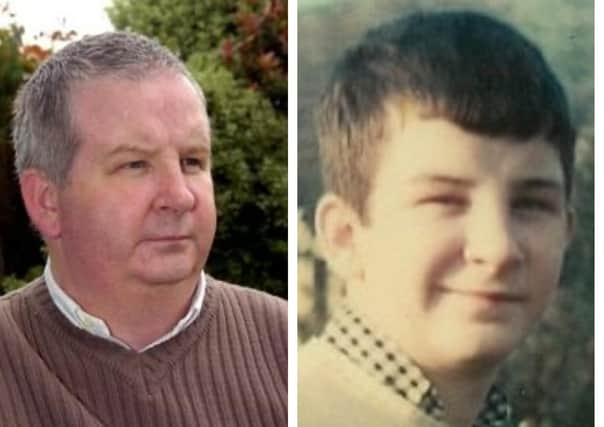‘What happened to me over those three days is still there, every day of the week.’


The Derry man was falsely imprisoned for three years in the 70s, with the High Court quashing all charges against him in 2007.
On Easter Sunday, 1978, he was 16-years-old and at home in the Bogside when the door was kicked in and the house surrounded.
Advertisement
Hide AdAdvertisement
Hide AdThe then teenager was interviewed for three days without a solicitor or parent present - questioned about the killing of a policeman.
He said he was ‘tortured,’ kicked and beaten ‘by grown men in their 30s and 40s, who called themselves policemen.’ Unable to take it any longer, he admitted to two charges of conspiracy to murder policemen.
The incidents happened when he was at St. Patrick’s training school in Belfast, so there was no way he could have been involved.
But, Charlie’s legal representation advised him that, if he did not plead guilty, he could be imprisoned for 25 years and the innocent teen was sentenced to two years in borstal. He served one year as he had been on remand in Crumlin Road Jail for two years.
Advertisement
Hide AdAdvertisement
Hide AdSpeaking to the ‘Journal’, Charlie said his imprisonment for something he did not do ‘is still impacting on me.’
“I wake up at night with nightmares because I think I’m still in that police station being tortured. I have the fear of that ever coming to my door again. I was 16 years old and I’m 60 next year, but what happened to me over those three days is still there, every day of the week.”
Appealing his conviction in 2007, Mr. McMenamin “claimed that he was physically and verbally abused by the detectives who interviewed him and that, as a result, he made and signed confessions that were untrue,” according to court documents.
Lord Justice Campbell, in quashing his conviction, stated: “Mr McMenamin was denied access to a solicitor or the presence of an independent adult until after he had made the admissions. This would in itself be a cause for concern. Where an accused has pleaded guilty to an offence which it is accepted by the prosecution he could not have committed and to another offence which it is believed never occurred this, inevitably, left the court with a significant sense of unease about the correctness of the convictions on the remaining counts to which he had pleaded guilty.”
Advertisement
Hide AdAdvertisement
Hide AdCharlie said that, if what happened him then occurred now, in 2020, ‘there’d be uproar and people would be on the streets.’
“At that stage, it was happening regularly with young people in the Bogside and Creggan. Also, in my experience through the years researching cases, I found that many young Protestants also went to prison for stuff they weren’t involved in.”
Charlie says that, because of what he experienced, ‘at times of my life I’ve been in bad places.’
While he was being questioned at Strand Road, Charlie says he tried to end his own life.
Advertisement
Hide AdAdvertisement
Hide Ad“A lot of people don’t realise what that means, when you’re sitting in a police station trying to do that, and they’re laughing at you. To me, it was the only way out.
“I wasn’t allowed to see my parents or solicitor. And there was legislation in place that allowed this to happen - Special Powers or special rules for special circumstances. It should never have happened.”
Charlie , who said he doesn’t see himself as a ‘victim, but as a survivor of conflict,’ feels relief that campaigning done around arrest and detention and the work of the Good Friday Agreement has led to change, but says he still gets ‘riled’ when he hears of a young person being arrested.
“As a person who does peace and reconciliation work, I try to use my experience as a former prisoner and as someone who was caught up in the conflict to try to keep young people out of court and the judicial system and for them to learn from my experience.”
Advertisement
Hide AdAdvertisement
Hide AdCharlie will be applying to the Troubles Victims’ Payments Scheme and says the exclusion of former prisoners and others should be changed.
A campaign is being led by the Derry Republican ex-prisoners’ organisation, Tar Abhaile, to have the restrictions on who can apply rescinded.
“I think everyone on the island of Ireland who is a victim or survivor of the conflict, regardless of where they’re coming from, should get some help, to help get them through life and support them. That’s what the pension will do.”
Charlie insists everyone should be treated equally.
“When I was in prison, nearly every third person had a brother or sister or auntie or uncle killed in the conflict. Are they not victims?
Advertisement
Hide AdAdvertisement
Hide Ad“Did they not lose people important to them and fought back because of that? Everyone should be treated the same.”
Charlie has accused the British government of ‘going against the goodwill of the Good Friday Agreement in recent years and they are still doing it.’ “The Good Friday Agreement created the circumstances for people like me to reflect on where I was, where I had been and how it affected me. I asked for my case to be reviewed and it was, but I was lucky as the documentation is still there.”
Charlie says the British Government has ‘created a hierarchy of victims’ with the restrictions.
“They want to treat some people as second and third class victims. There’s no such thing. If someone has been hurt in this conflict they should be treated well and supported in any way possible.”